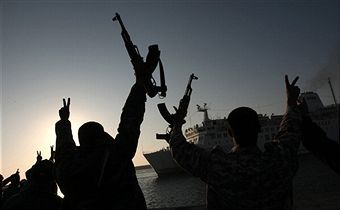 This is one of the key questions about the Libya intervention. The Libyan Fighting
Islamic Group was once one of the largest jihadist groups in the world and many Libyans fought in Iraq. So the fear of al Qaeda’s presence in Libya is well-founded. The terrorist network certainly
appears to be trying to associate itself with the rebellion, much as the Muslim Brotherhood tried to exploit events at Tahrir Square.
This is one of the key questions about the Libya intervention. The Libyan Fighting
Islamic Group was once one of the largest jihadist groups in the world and many Libyans fought in Iraq. So the fear of al Qaeda’s presence in Libya is well-founded. The terrorist network certainly
appears to be trying to associate itself with the rebellion, much as the Muslim Brotherhood tried to exploit events at Tahrir Square.
But there is very little evidence to fuel concern about Al Qaeda, except for a quote from Admiral James Stavridis, who said that there had been “flickers in the intelligence of potential al Qaeda” and “Hizbollah” involvement. Notice the word “potential”. The NATO commander even went on to say that he did not have evidence of “a significant al Qaeda presence or any other terrorist presence.”
Former al Qaeda associate Noman Benotman from the Quillam Foundation is absolutely clear – jihadists are an “insignificant” part of the fight against Colonel Gaddafi. This echoes Robert Gates’ view that Al Qaeda will not be able to “highjack” the rebellion. This reflects my brief experience on the ground in eastern Libya, where the bulk of the rebellion seems to be run by nationalists not jihadists.
None of this has prevented people from tarnishing the rebellion with the accusation that is has been infiltrated by al Qaeda. Who, in truth, knows who makes up the rebels; or what will happen if the fighting goes on for a long time? But unlike in Bosnia, where Islamists helped the Bosniaks in their fight against the Bosnian Serbs, the Free Libya authorities have been clear that they will not tolerate any kind of al Qaeda presence among their ranks. For now the worry about al Qaeda seems overblown.






Comments